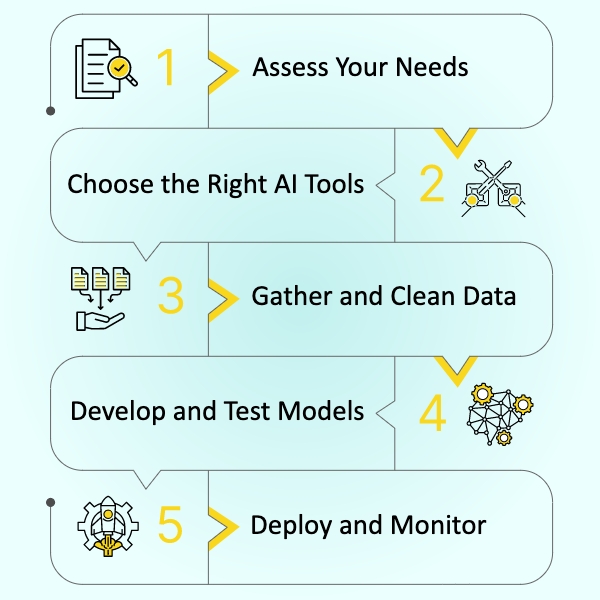
AI Integration for Applications: A Guide in 2025
In today’s fast-evolving digital landscape, Artificial Intelligence (AI) has transitioned from being a futuristic buzzword to a must-have technology in every organization. AI in application development, from chatbots to personalized recommendations, has revolutionized how businesses interact with customers, manage operations, and deliver value. If your app lacks AI, it’s not just behind the curve—it might be missing out on significant growth opportunities. AI solutions for enterprises will be a necessity that cannot be overlooked in the coming years.
Reasons to Consider Integrating AI into Your App in 2025
2025 is shaping up to be the year of smarter, more efficient applications. Here are the benefits of AI integration in you Apps:
- Enhanced Customer Experience: AI enables features like chatbots, voice assistants, and tailored recommendations that make your app intuitive and user-friendly.
- Operational Efficiency: Automating repetitive tasks frees up resources for strategic priorities.
- Competitive Edge: With AI, you can stay ahead by offering features your competitors might lack.
- Data-Driven Decisions: AI analyzes user data to help you make informed decisions.
- Cost Savings: AI reduces manual errors and operational inefficiencies.
Features of AI Integration
AI integration into an application transforms how users interact with your product while enhancing backend processes. Here’s a detailed look at some standout AI features for mobile applications:
1. Predictive Analytics
AI analyzes historical and real-time data to predict user behavior or trends. An example can be an eCommerce app suggesting inventory purchases based on the stock left and time for delivery. It helps manage the inventories at an optimum level, following a just-in-time methodology.
2. Personalization
With the help of user preferences and behavior, the AI system would personalize content, recommendations, and experiences to the user. Netflix recommends shows based on viewing habits, boosting user engagement and satisfaction.
3. Automation
Repetitive and mundane tasks are automated to save time and utilize it in more productive works using AI algorithms and tools. This reduces operational costs and improves efficiency.
4. Enhanced Security
AI identifies patterns to detect anomalies, fraud, or breaches, which is perfect for banking apps to flag unusual transactions. It protects sensitive user data and builds trust.
How to Integrate AI? (Basic Guidance)
Let's get an eagle's eye view on what are the basic steps of developing AI-powered applications:
- Assess Your Needs: Identify which processes or features could benefit most from AI.
- Choose the Right AI Tools: Select AI frameworks or platforms tailored to your app's requirements (e.g., TensorFlow, IBM Watson, AWS AI services).
- Gather and Clean Data: AI thrives on data. Ensure your datasets are relevant and free of errors.
- Develop and Test Models: Build AI models, test them for accuracy, and ensure they integrate smoothly with your app.
- Deploy and Monitor: Roll out the AI-powered features while continuously monitoring performance and making improvements.
Challenges of Integrating AI
There are a few challenges that need to be addressed before we use AI for business application development.
1. Data Privacy Concerns
It can be tough handling sensitive user data while adhering to privacy regulations (e.g., GDPR, HIPAA). A robust encryption, anonymization, and secure data storage practices can answer the challenge.
2. Complexity in Implementation
AI models require expertise in machine learning, data science, and app development that can be dealt with using pre-built AI services like AWS, Google AI, Azure, or an experienced App Developer such as Seaflux.
3. Cost of Development
AI features attract a significant amount of investment in infrastructure, tools, and skilled professionals. A small-scale AI project can be initiated to understand the dynamics and then leverage cost-efficient cloud services to expand.
4. Scalability Issues
It would be challenging for a localized AI system to scale and handle the increased user data. The use of cloud-based AI platforms can be a better option to scale dynamically with user demand.
5. Bias in AI Models
A biased or inaccurate outcome due to poorly trained models may lead to user dissatisfaction. To overcome this challenge, diverse datasets can be used to train the AI model and regular audits to maintain fairness and accuracy.
Real-Life Examples of AI Integration
As we have gone through the integration process and the challenges it can face, let us now see some real-world AI applications that have done wonders for their organization.
1. eCommerce Apps:
eCommerce organizations, like Amazon, are already cashing in with AI powers to recommend personalized items and give dynamic pricing according to user behavior. They also use AI for inventory management as well as targeted marketing.
2. Healthcare Apps:
Babylon Health has integrated an AI-powered chatbot to assist their patients in diagnosing symptoms and providing healthcare advice. It has reduced the consultation time by 40% and streamlined the triage process. The burden on the healthcare providers has been reduced significantly and increased healthcare efficiency while ensuring patients receive timely guidance. Seaflux has worked on a similar project, where it used the RAG to fine-tune the chatbot diagnosing the symptoms.
3. FinTech Apps:
Mastercard has employed AI to detect or predict fraudulent transactions by analyzing the transactional history to enhance transaction monitoring, improving the trustworthiness of payment systems.. It has helped Mastercard prevent over $35 billion in fraud-related losses since 2020. AI has enhanced transaction monitoring, improving the trustworthiness of payment systems.
4. Entertainment Apps:
Netflix and Spotify have disrupted the market with their state-of-the-art use of AI in recommending movies (Netflix) and curating personalized playlists (Spotify). 80% of content watched on Netflix is AI-recommended and on Spotify, 30% of listening time is attributed to AI-curated playlists.
ROI undefined Scalability
Return on Investment (ROI)
Businesses report up to 40% reduction in operational costs with AI-driven automation. AI-powered personalization can increase customer spending by 20-30%. Improved user experiences lead to higher loyalty and lifetime value.
Scalability Benefits
Cloud-based AI solutions (e.g., Google Cloud AI, AWS AI) allow businesses to scale operations without major infrastructure upgrades. AI models improve over time, handling more complex tasks as your app grows. Adding new AI capabilities (e.g., NLP or image recognition) can often be done modularly, reducing development time.
By embracing AI, businesses can ensure their apps remain competitive, efficient, and adaptable to future demands.
How Can Seaflux Help You in Your Journey?
At Seaflux, we specialize in delivering cutting-edge AI solutions tailored to your business needs. Whether you’re looking to build an AI-powered app from scratch or enhance an existing one, our team of experts will guide you every step of the way—from ideation to deployment.
Our expertise spans:
- AI/ML Development
- Cloud Integration
- Data Engineering
- Enterprise Mobility
- Blockchain
End Note
Integrating AI into business operations isn’t just about staying relevant—it’s about future-proofing your business. By leveraging AI in Business Apps 2025, you can deliver unmatched value, scale effortlessly, and maximize returns.
Ready to embrace the power of AI? Would you like to expand on any section or focus on specific industries?
We, at Seaflux, are AI undefined Machine Learning enthusiasts, who are helping enterprises worldwide. Have a query or want to discuss AI projects where LiteLLM can be leveraged? Schedule a meeting with us here, we'll be happy to talk to you.

Aashutosh Mishra
Senior Marketing Executive








